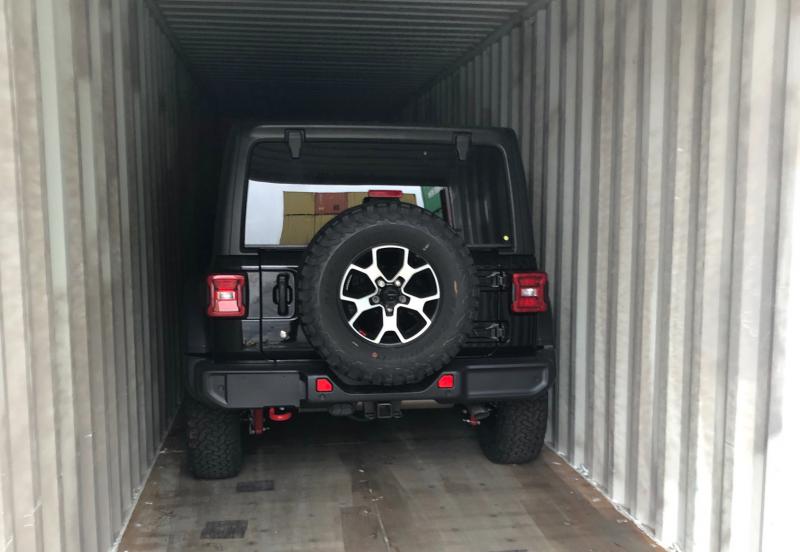BALTIMORE – Transnational criminal organizations are constantly looking to increase their illicit revenue streams, including stealing vehicles from emotionally crushed owners to sell in overseas markets far away from the long arms of United States law enforcement. But to bank those ill-gotten gains, criminals need to quickly export the stolen vehicles.

2019 Range Rover before it could be exported.
The only thing that stands between criminals and their profit are U.S. Customs and Border Protection officers who conduct diligent outbound cargo examinations at our nation’s seaports. Few do that better than CBP officers from the Baltimore Field Office
CBP’s Baltimore Field Office officers intercepted 157 stolen vehicles that were being shipped overseas during fiscal year 2020 (Oct. 1, 2019 through Sept. 30, 2020). The total value of those stolen vehicles was nearly $5 million.
The Baltimore Field Office ranked second nationally behind only the New York Field Office, which recovered 310 stolen vehicles during 2020. Nationally, CBP’s Office of Field Operations recovered 832 stolen vehicles during import and export examinations.
During fiscal year 2019, the Baltimore Field Office trailed the New York Field Office by 11 (257-246 stolen vehicle recoveries).
Nationally, CBP Office of Field Operations recovered 1,082 stolen vehicles, of which 833 were destined overseas.
“Transnational criminal organizations use stolen vehicles as a form of currency to fund their illicit enterprise and it is incumbent upon us to disrupt their trade in stolen vehicles through rigorous outbound cargo examinations,” said Casey Durst, Director of Field Operations for CBP’s Baltimore Field Office. “Import and export examinations remain a critical component to Customs and Border Protection’s border security and trade facilitation missions.”
Within CBP’s Baltimore Field Office, the Area Port of Baltimore seized 152 stolen vehicles valued at about $4,774,000, and the Port of Wilmington seized five stolen vehicles valued at about $102,000. CBP officers turned all stolen vehicles over to local police for investigation.
During the last three years, CBP officers have observed a significant rise in the number of recovered stolen vehicles. From 2015 through 2017, Baltimore Field Office officers recovered 41, 14, and 43 vehicles, respectively. However, officers recovered 109 stolen vehicles during 2018, a record 246 during 2019, and 157 this year.
The following are additional details on recovered outbound stolen vehicles during 2020.
- The Baltimore Field Office ranked #2 nationally with 157 recovered stolen vehicles (NY Field Office: 310). The value of those vehicles was about $4,876,000.
- The Area Port of Baltimore ranked #2 nationally with 152 recovered stolen vehicles (Port of NY/NJ: 310). CBP’s Port of Wilmington recovered five outbound stolen vehicles.
- 89 percent (140 vehicles) were destined to West African nations, including Benin, The Gambia, Ghana, Guinea, Ivory Coast, Liberia, Nigeria, Senegal, Sierra Leone, and Togo.
- The top-3 destination countries were Togo (36 vehicles), Ghana (28) and Nigeria (26). These countries represent 57 percent of recovered stolen vehicles.
- 55% (87 recovered stolen vehicles) were reported stolen from the Mid-Atlantic states of New Jersey (19), Pennsylvania (9), Delaware (2), Maryland (37), and Virginia (16), plus Washington D.C. (4).
- The top-5 states were Maryland (37), New Jersey (19), Virginia (16), New York (14), and Pennsylvania (9). These states represent about 61% of recovered stolen vehicles.
- 62 percent (97 vehicles) were from model years 2019 and 2020.
- Sport utility vehicles comprised 66 percent (104 vehicles) of recovered stolen vehicles; sedans equaled 24 percent (37 vehicles).
- The top-5 recovered stolen vehicles were the Land Rover Range Rover (13), Toyota Camry (10), Toyota Highlander (10), Infinity QX80 (8), and a three-way tie of Jeep Wrangler (5), Lexus RX350 (5) and Toyota Corolla (5).
- The most expensive recovered stolen vehicle was a 2019 Land Rover Range Rover, valued at $114,175; it was destined to Guinea.
- The newest vehicle was a 2020 Maserati Ghibli, valued at $78,485 and destined to Jordan.
- The oldest vehicles were a 1999 Nissan Frontier destined to Guatemala, and a 1999 Lexis RX300 destined to Nigeria.

2020 Wrangler, in outbound shipping containers.
The Baltimore Field Office spans from Central New Jersey to Northern Virginia and west to Pittsburgh. The Ports of Baltimore, Philadelphia and Wilmington are the three primary vehicle import/export pots.
CBP officers routinely examine outbound vehicle documentation for authenticity and compliance, and compare vehicle identification numbers (VIN) to stolen vehicle reports. Officers also ensure that all vehicles comply with existing U.S. laws and regulations. See CBP guidance for Exporting a Motor Vehicle.
CBP's border security mission is led at ports of entry by CBP officers from the Office of Field Operations. CBP officers screen international travelers and cargo and search for illicit narcotics, unreported currency, weapons, counterfeit consumer goods, prohibited agriculture, and other illicit products that could potentially harm the American public, U.S. businesses, and our nation’s safety and economic vitality.
Please visit CBP Ports of Entry to learn more about how CBP’s Office of Field Operations secures our nation’s borders. Learn more about what CBP accomplished during “A Typical Day” in 2019.

